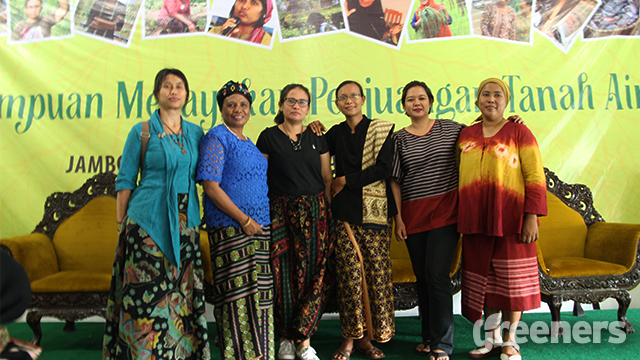Garut (Greeners) – Exploitation on lands and water resources by corporate have directly affecting women’s welfare and their future as well as their families.
Unfortunately, women have lack of chances to defend themselves and fight for their rights of lands. Meanwhile, due to exploitation, women as the figure close to natural resources, they have become vulnerable of the impacts.
Siti Maimunah, researcher and coordinator of Sajogyo Institute Scholarships Program, underlined negative stigma stick on women if they have chosen to fight. The stigma, then, resulted to lack of bravery and confidence for women to fight.
“Don’t even think about leading a struggle, it’s already hard for them to even join due to those constructed stigmas,” said Maimunah at the sideline of jamboree of women fighters in Garut, on Sunday (16/7).
READ ALSO: Women Fighters of Indonesia Jamboree Brings Together Tough Women To Talk About Environment
She cited Aleta Baun’s case who had fought for indigenous peoples rights and the environment against marble mining in East Nusa Tenggara.
On early days of her fight, she said, Mama Aleta was often labeled as irresponsible mother, prostitute and even accused of having an affair with the motorcycle driver (ojek) as she mostly went out in the middle of the night to organize other indigenous women in her village.
“Imagine if that’s a man, then he wouldn’t have to face those negative stigmas,” she argued.
Furthermore, she said that women’s struggles was not something easy as they have to plan strategies, organize the people and fight for their homeland and at the same time, they have to think about their husbands and children, for their food, other domestic chores, which would not be the same case with men fighters.
Other women fighters are Eva Susanti Hanafi Bande, who fights for farmers’ rights against PT Kurnia Luwuk Sejati and Gunarti, the first female to organize mothers of Sukolilo village of Pati district in Central Java protesting against mining activities.
READ ALSO: Households Bear High Health Risks From Solid Fuels
Their struggles, said Maimunah, were triggered from a tipping point of lifetime experience, including becoming police target, sent to prison and left their families.
“Does it need to experience those tipping points to fight for their homeland? Does it need to have casualties? That’s not the case, isn’t it. It’s the reason we gather all these women with struggles of their own on this jamboree for them to share their minds, ideas and stories,” she said.
The term “Homeland Fighters” was coined based on situations faced by the women against all kinds of destruction. Meanwhile, jamboree is the platform for all women to meet, study and lesson learned from different backgrounds.
Nissa Saadah Wargadipura, one of founder of Ecology Islamic Boarding School, At-Thaariq, Garut, shared her story on social ecological crisis in Garut, underlining to start the struggle was never easy, for instance starting ecological boarding school which applied agro-ecology method.
When it was started, Wargadipura recalled, there were criticisms and disbelief that the method would succeed.
“Previously, no one believed in our agriculture method, which does not follow mainstream agriculture pattern that destroys land and water. Most importantly, our farming needs are self-sufficient, such as fertilizer, seedling bank to store local seeds, we also domesticate snake to balance the ecosystem,” she said. “This is the answer for food security. Agro-ecology is the answer from Islamic boarding school on maintaining good relationship between human and nature as we seek for honor, grace, dignity and not just profits.”
Reports by Danny Kosasih



















































